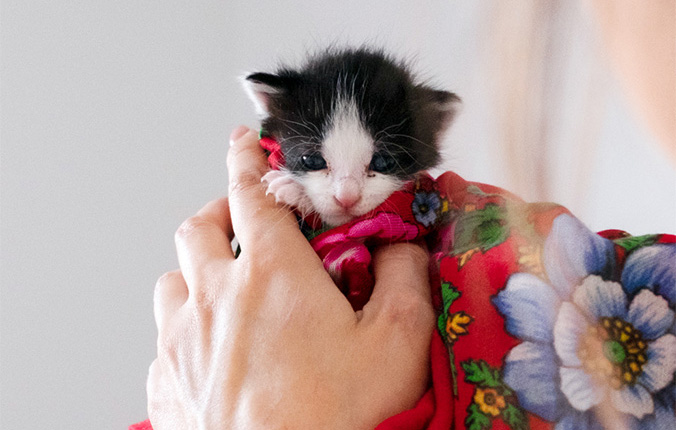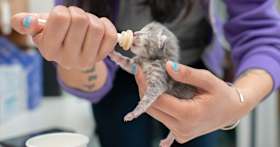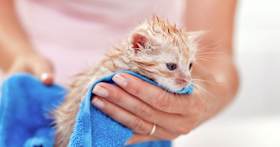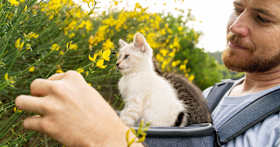How to Take Care of a Kitten Without a Mother
Orphaned kittens are vulnerable and need special care. Here’s what you need to know to help them thrive.
Orphaned kittens are vulnerable and need special care. Here’s what you need to know to help them thrive.
by Katie Koschalk, | August 28, 2024

Adri / Shutterstock
Finding tiny kittens alone outside can be concerning, and you might feel inclined to scoop them up and bring them to a shelter or your home. But before you jump into rescue mode, Samantha Bell, cat expert at Best Friends Animal Society, says it’s vital to determine whether the kittens are orphans or if mom is simply out of sight.
“If you find kittens outside on their own, the best thing to do (for healthy kittens) is to leave them with their mother, who is often nearby, planning to return and care for her babies,” Bell says.
But if you’re confident the kittens have indeed been left behind, they could really use your help. Knowing how to step in can make all the difference in their survival. In this guide, we’ll walk you through how to determine if kittens have been orphaned and share vital tips about caring for these vulnerable babies.
While it might seem surprising, taking healthy outdoor kittens away from their mother and bringing them to a shelter isn’t what’s best for them. According to Bell, kittens have a much better chance of survival when they stay with their mom outside, rather than being placed in a shelter. “Mother cats provide a level of care for their kittens that is impossible for humans to replicate,” she says.
Another factor is shelter overcrowding, which worsens during kitten season. Most shelters lack the time, space, and resources to provide around-the-clock attention to the many kittens in their care. Because of this, moving healthy kittens who are being cared for by their mother to a shelter could increase their risk of death.
That’s why it’s crucial to determine if the kittens you find outside are truly orphaned or if their mother is still caring for them. So, how do you do that?
“If they look clean and plump, this indicates that their mother has recently been caring for them,” Bell says. “If the kittens look sick, dirty, or thin, it’s likely that something has happened to their mother.” In cases where the kittens appear to be unwell or suffering, Bell says the best thing to do is to take them to a nearby veterinarian as soon as possible.
Weather is another consideration. If it’s below 65 or above 85 degrees Fahrenheit, or the kittens are exposed to rain or snow, taking them to a veterinarian, shelter, or your home is recommended.
If the kittens look clean and plump and are in a safe location, Bell says to leave them where they are and wait for the mother to return. If they appear healthy but are in an unsafe location, Bell explains that it’s best to move them to a safer location nearby. Danger for kittens could include cars, dogs, or wildlife.
“While waiting for the mother to return, it’s important that you do not stand too close to the kittens,” Bell says. “Many outdoor cats are afraid of humans and will be too scared to return.”
Bell explains that it may take the mother cat a long time to return, sometimes up to 12 hours, because she’s likely out searching for food. If you can’t wait around for several hours, there are a couple of things you can do. Stay as long as you can, then check back in a few hours. If the mother still hasn’t returned, check again a few hours later.
Another option, Bell says, is to pour a ring of flour around the kittens before you leave. Check back in a few hours and see if there are adult cat footprints in the flour, which would suggest the mother has returned to her kittens.
Note: If the kittens appear healthy and at least six weeks of age, reach out to your local rescue group to arrange spaying or neutering. Kittens between six to eight weeks old will be very active, playful, and weigh about one to two pounds. If they appear healthy but younger than six weeks, they’re still too young for spaying or neutering. However, you can still inform a rescue group, which may be able to assist once the kittens are old enough. If you want to do something to help in the meantime, you can provide the mother cat with food and water.

What to do when you find kittens
If you’ve determined that the mother cat isn’t coming back, you have a few options: You can take the kittens to a veterinarian, to a shelter, or home with you. If you decide to care for them yourself, be aware that caring for very young kittens is a demanding task that requires specific supplies and careful attention. These fragile animals will rely on you entirely for their survival, so it’s crucial to approach this responsibility with seriousness and dedication.
If you’re up for the task, it’s recommended that you connect with a rescue or shelter that can provide you with information and help with finding the kittens permanent homes once they’re old enough.
Below are some essential tips for fostering abandoned kittens.
Caring for orphaned kittens requires specific supplies. Here’s what you’ll need:
Kitten formula, a.k.a. kitten milk replacer (do not use cow’s milk or any other kind of milk made for humans)
A kitten nursing bottle with a nipple (Miracle Nipple is recommended)
One 3-cc needle-less syringe with a nipple (some people prefer this to a bottle)
Canned kitten food
A kitchen scale
A kitten-safe heating pad, such as a K&H or SnuggleSafe pet bed warmer
Blankets
Puppy pads (to prevent messes)
A small, foil-pan litter box
Kitty litter
If the kittens are less than five weeks old, they will likely need to be bottle-fed kitten formula, which can be found online or at pet stores. “It’s important to note that cats’ and kittens’ stomachs cannot digest cow’s milk, and it will make them very sick,” Bell says.
When feeding orphaned kittens, Bell says the goal is to replicate the “mother cat experience” as best you can. Warm the formula by heating a mug of water and floating the formula-filled bottle or syringe in it until it reaches about 100 degrees Fahrenheit (the temperature of a mother cat’s milk). Before feeding, test the formula on your wrist to make sure it’s warm, not hot. Bell advises always feeding the kittens while they’re lying down on their stomachs, as this is the natural position in which they would feed with their mother.
There’s still a lot more to the bottle-feeding process, so refer to our complete guide on how to bottle-feed kittens like a pro.
When not directly caring for bottle-fed kittens, you should keep them in a cat carrier or small crate lined with soft bedding. This is for their safety, because they could hurt themselves if they have free run of the house.
Bell suggests putting a heating pad under a blanket. “You also want to ensure they can move off the heat source in case they feel too hot, so make sure they have a non-heated section, too,” she says. Never place a kitten directly on a heating pad without towels — this could burn them.
Kittens usually need a heating pad until they’re about three to five weeks old, after which they can regulate their own body temperatures.
Kittens under three weeks of age can’t yet eliminate waste on their own, so you’ll need to stimulate them to urinate and defecate by gently rubbing their genital area with a paper towel after each feeding. If a kitten gets messy, gently wipe them clean with a damp, warm washcloth.
You should also keep their bedding clean and dry, and clean their feeding bottle whenever it’s empty.
Socialization is key to raising well-adjusted cats. Spend time gently handling and interacting with the kittens daily to help them get used to human touch and develop trust.
If you’re caring for multiple kittens, allow them to stay close to each other, like they would if they were with their mother. A singleton kitten might benefit from being introduced to another young litter.
Abandoned kittens are particularly vulnerable to health issues, and it’s important to recognize the signs of trouble early on. Without their mother’s care, they can quickly become sick or weak, so monitoring their condition is essential. Here are a few symptoms to look out for when caring for orphaned kittens.
Lethargy or weakness: Kittens can sleep 20 to 22 hours a day, but if they seem overly lethargic or weak when awake, this could indicate illness.
Dehydration: Gently pinch the skin at the scruff of the kitten’s neck. If it doesn’t snap back into place quickly, the kitten may be dehydrated.
Poor weight gain: Weigh the kittens daily using a kitchen scale to ensure they’re consistently gaining weight. Stalled weight gain or weight loss is often a sign of an underlying issue.
Labored breathing: If a kitten is struggling to breathe or breathing heavily, this could signal a respiratory issue.
Diarrhea or vomiting: Continuous diarrhea or frequent vomiting can indicate digestive problems, infections, or intolerance to their formula.
Pale gums: Pale gums can be a sign of anemia, poor circulation, or low oxygen levels, which could indicate serious health issues such as internal bleeding, parasites, or infections.
Swollen belly: A swollen belly in a kitten can indicate intestinal parasites (such as worms), overeating, constipation, or even more serious conditions like fluid buildup from an infection or organ problems.
If you notice any of these symptoms or have any concerns about the kittens’ health, contact a veterinarian or take them to an emergency pet clinic as soon as possible. Early intervention can be lifesaving for these fragile animals.
Orphaned kittens can survive with proper care, but they are fragile and require around-the-clock attention. Ensuring they receive adequate warmth, nutrition, and hygiene significantly increases their chances of survival.
Newborn kittens can typically only go two to three hours without milk. If they go much longer, they risk dehydration and malnutrition. It’s crucial to feed very young kittens on a strict schedule to ensure they thrive.
Age can be estimated by physical characteristics. For example, kittens’ eyes open around seven to 10 days, and they start wobble-walking around three weeks. Weight is another clue. Most newborn kittens weigh around three to four ounces, doubling their weight by week two.
Touching newborn kittens is okay if necessary for their care, but it’s best to limit handling as much as possible, especially if their mother is around. Excessive handling can stress them out.
Baby Kittens: From Found to Adopted
The Easiest Tutorial on How to Bottle-Feed Kittens

Katie Koschalk is a freelance writer based in Northern California. Fusing her love and knowledge of animals with her journalism degree and years of professional writing, Katie is dedicated to improving the lives of pets and their caretakers by sharing helpful and accurate information. When she’s not at her desk, you can find her exploring trails with her Aussie, Hunter, cooking plant-based meals, and talking to her two cats, Jax and Sadie, in really ridiculous voices.

Foster & Volunteer

Foster & Volunteer

Adoption Advice

Adoption Advice
Learn about the key vaccinations and environmental considerations that go into determining when it’s okay for your kitty to venture out of your home.

Behavior & Training
From diet to health concerns, here’s a guide to how to know for sure, what may be causing this issue in your cat, as well as some potential treatments for it.

Behavior & Training
Is your cat refusing to use their litter box? Explore these tactics to address and resolve this issue.

Adoption Advice
Cat introduction process not going well? Here’s what might be causing the issues.

Behavior & Training
Cats aren’t bad, they’re just wild. Here’s how to satisfy their natural instincts without sacrificing your home — or sanity.

Adoption Advice
By creating a safe space, respecting your cat’s boundaries, and using positive reinforcement, a shy cat can absolutely thrive in your home.